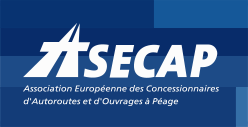FAQS
WHAT IS TOLL?
1. Toll is the revenue collected by a company, and considered as assets of its budget, from all or a category of the users of a road infrastructure or a road network, for one or several of the following purposes:
- To finance
- To build
- To maintain
- To operate
- To improve
the above mentioned road infrastructure or road network.
2. Within ASECAP, most members are responsible for each and every of the above responsibilities.
3.Within ASECAP, toll is in principle distance-related. Even though in some cases it is time-related for certain categories of users, all ASECAP members consider that toll should, in the future, be primarily distance-related, even if other criteria could be taken into account in its calculation.
WHY THE TOLLS?
Are the toll facilities responsible for causing or increasing traffic congestion?
The answer of the modern tolled motorways is negative.
In addition, the European Motorways member of ASECAP work firmly towards an interoperable EFC (Electronic Fee Collection) system, which will further facilitate the traffic and will increase significantly the average traffic speed through the toll plazas.
Is it true that the tolls represent additional taxation for the road users?
The answer is simple for real tolls: the road users pay a toll to the concession holding company for the use of a specific infrastructure and the facilities and services provided. The same users also pay taxes to the State. However, tolls cannot be considered as additional taxation for the users, because State revenues from taxes are also used to finance other social goods, while the tolls constitute a direct user payment for the quality services he or she receives when using the road network in question.
Where does the money paid for the tolls go?
The modern road operator does not simply offer a "transit service" to the road users, but a real "product", which needs a series of investments.
The toll revenues are effectively re-invested in order to improve the tachnical qualities of motorway infrastructures and to guarantee, among other things, a higher level of road safety, the respect of the legislative and regulatory framework for the protection of the environment, the provision of a series of services linked to info-mobility (i.e. information in real time about traffic evolution, meteorological conditions, tourist and cultural events happening in the region).


 Theme:Acting to change driver's behaviour to reach vision...
Theme:Acting to change driver's behaviour to reach vision... The 51st ASECAP Study & Information Days will be held on 13-15 May...
The 51st ASECAP Study & Information Days will be held on 13-15 May...